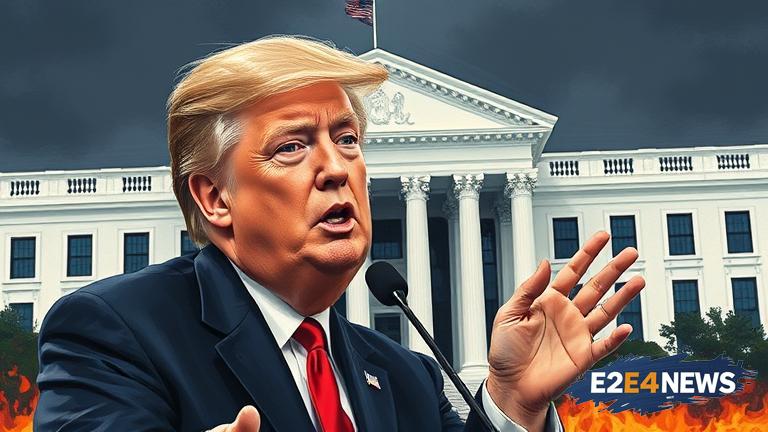President Donald Trump has intensified his criticism of the Federal Reserve, stating that he will fire a board member if they do not comply with his demands for monetary policy changes. This move is seen as an escalation of the ongoing feud between the President and the Federal Reserve, with Trump arguing that the central bank’s policies are hindering economic growth. The Federal Reserve, led by Chairman Jerome Powell, has maintained its independence and refused to bow to Trump’s pressure. The President’s threat has sparked concerns among economists and policymakers, who warn that such actions could undermine the credibility and stability of the US financial system. The Federal Reserve’s monetary policy decisions are designed to promote maximum employment and price stability, and are made independently of political influence. Trump’s criticism of the Federal Reserve has been ongoing, with the President arguing that the central bank’s interest rate policies are too restrictive and are preventing the economy from reaching its full potential. The President has also been critical of the Federal Reserve’s decision to raise interest rates, which he believes has strengthened the US dollar and made American exports more expensive. Despite these criticisms, the Federal Reserve has maintained its commitment to its dual mandate of maximum employment and price stability. The central bank has also emphasized the importance of its independence, arguing that it is essential for making objective and unbiased monetary policy decisions. The threat to fire a Federal Reserve board member has raised concerns about the potential consequences for the US economy and financial markets. Some economists have warned that such actions could lead to a loss of confidence in the US financial system, and potentially even trigger a recession. Others have argued that the President’s actions are an attempt to politicize the Federal Reserve and undermine its independence. The Federal Reserve’s independence is seen as a key factor in its ability to make effective monetary policy decisions, and any attempts to compromise this independence could have significant consequences for the US economy. The President’s threat has also sparked a debate about the limits of presidential power and the role of the Federal Reserve in the US financial system. Some have argued that the President does not have the authority to fire a Federal Reserve board member, while others have suggested that such actions could be seen as an attempt to intimidate the central bank. The Federal Reserve has a long history of independence, and its ability to make monetary policy decisions without political influence is seen as essential for maintaining economic stability. The President’s criticism of the Federal Reserve has also been seen as an attempt to shift the blame for the US economy’s performance away from his own administration’s policies. Despite these criticisms, the Federal Reserve remains committed to its dual mandate and will continue to make monetary policy decisions based on its assessment of the US economy. The central bank’s independence is seen as a key factor in its ability to make effective monetary policy decisions, and any attempts to compromise this independence could have significant consequences for the US economy. The President’s threat to fire a Federal Reserve board member has raised concerns about the potential consequences for the US economy and financial markets, and has sparked a debate about the limits of presidential power and the role of the Federal Reserve in the US financial system. The Federal Reserve’s ability to maintain its independence and make objective monetary policy decisions is seen as essential for promoting economic stability and growth. The President’s actions have also been seen as an attempt to politicize the Federal Reserve and undermine its credibility, which could have significant consequences for the US economy and financial markets. The Federal Reserve’s commitment to its dual mandate and its independence is seen as a key factor in its ability to make effective monetary policy decisions, and any attempts to compromise this independence could have significant consequences for the US economy.
